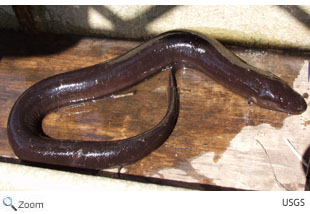|
 There are only three species in this family. Amphiuma are found in the southeastern United States. They have smooth skin, very long bodies, and very tiny legs. In fact, amphiuma look like eels and are sometimes called
Congo eels. There are only three species in this family. Amphiuma are found in the southeastern United States. They have smooth skin, very long bodies, and very tiny legs. In fact, amphiuma look like eels and are sometimes called
Congo eels.
Amphiumas have gill slits and lungs and are found in slow moving streams, lakes,
marshes, swamps, ditches, and bayous. They spend the day in burrows in the mud or in vegetation.
Amphiumas are nocturnal and eat amphibians, insects, reptiles,
crayfish, worms, and fish. One species, the
three-toed amphiuma, can be three feet long!
Female amphiumas lay clusters of up to 200 eggs. The female cares for the eggs until they hatch at 20 weeks. The
larvae have external gills. When they become adults, they lose their gills but keep a pair of gill slits.
World Status Key
 Least Concern Least Concern  Near Threatened Near Threatened  Vulnerable Vulnerable  Endangered Endangered  Critically Endangered Critically Endangered  Extinct in Wild Extinct in Wild  Extinct Extinct
Status taken from ICUN Redlist. If no status is listed, there is not enough data to establish status, or there is no status data for the species.
US Status Key
 Threatened in US Threatened in US  Threatened in NH Threatened in NH  Endangered in US Endangered in US  Endangered in NH Endangered in NH  Introduced Introduced
Status taken from US Fish and Wildlife and NH Fish and Game
Location Key
 Africa Africa  Asia Asia  Australia Australia  Europe Europe  North America North America  South America South America  NH NH  Click for More Info Click for More Info  Click for Image Click for Image
New Hampshire Species |
|
North/Central American Species |
| None |
|
One-toed Amphiuma - Amphiuma pholeter   
Three-toed Amphiuma - Amphiuma tridactylum    
Two-toed Amphiuma - Amphiuma means     |
Additional InformationResource Key
 Profile Profile  Photos Photos  Video Video  Audio Audio
Amphiuma  
The three salamanders in this family are often called “congo eels”, “conger eels”, “ditch eels’, “lamp-eaters”, and “congo snakes.”
Source: Caudata Culture Intended Audience: General Reading Level: Middle School One-toed Amphiuma - Amphiuma pholeter   
The one-toed amphiuma is only found in Florida and a small part of southern Georgia
Source: Savannah River Ecology Lab Intended Audience: General Reading Level: Middle School
One-toed Amphiuma - Amphiuma pholeter   
The one-toed amphiuma is 8.5 - 12.5 inches long.
Source: Georgia Museum of Natural History Intended Audience: General Reading Level: Middle School
One-toed Amphiuma - Amphiuma pholeter   
The one-toed amphiuma is 8.5 - 12.5 inches long.
Source: Arkive Intended Audience: General Reading Level: Middle School One-toed Amphiuma - Amphiuma pholeter    
The one-toed amphiuma is 8.5 - 12.5 inches long.
Source: Amphibia Web Intended Audience: General Reading Level: High School
Two-toed Amphiuma - Amphiuma means    
The two-toed amphiuma can be up to four feet in length.
Source: Savannah River Ecology Lab Intended Audience: General Reading Level: Middle School
Two-toed Amphiuma - Amphiuma means    
The two-toed amphiuma has large, sharp teeth.
Source: U.S. Geological Survey Intended Audience: General Reading Level: Elementary School
Two-toed Amphiuma - Amphiuma means    
Two-toed amphiumas mate in late winter.
Source: Amphibia Web Intended Audience: General Reading Level: High School
Three-toed Amphiuma - Amphiuma tridactylum    
Three -toed amphiumas are found from western Alabama to eastern Texas, and north through the Mississippi Valley to the southeastern portion of Missouri.
Source: National Zoo Intended Audience: Students Reading Level: Middle School
Three-toed Amphiuma - Amphiuma tridactylum    
The three-toed amphiuma grows up to almost 42 inches long.
Source: St. Louis Zoo Intended Audience: Students Reading Level: Middle School
|

